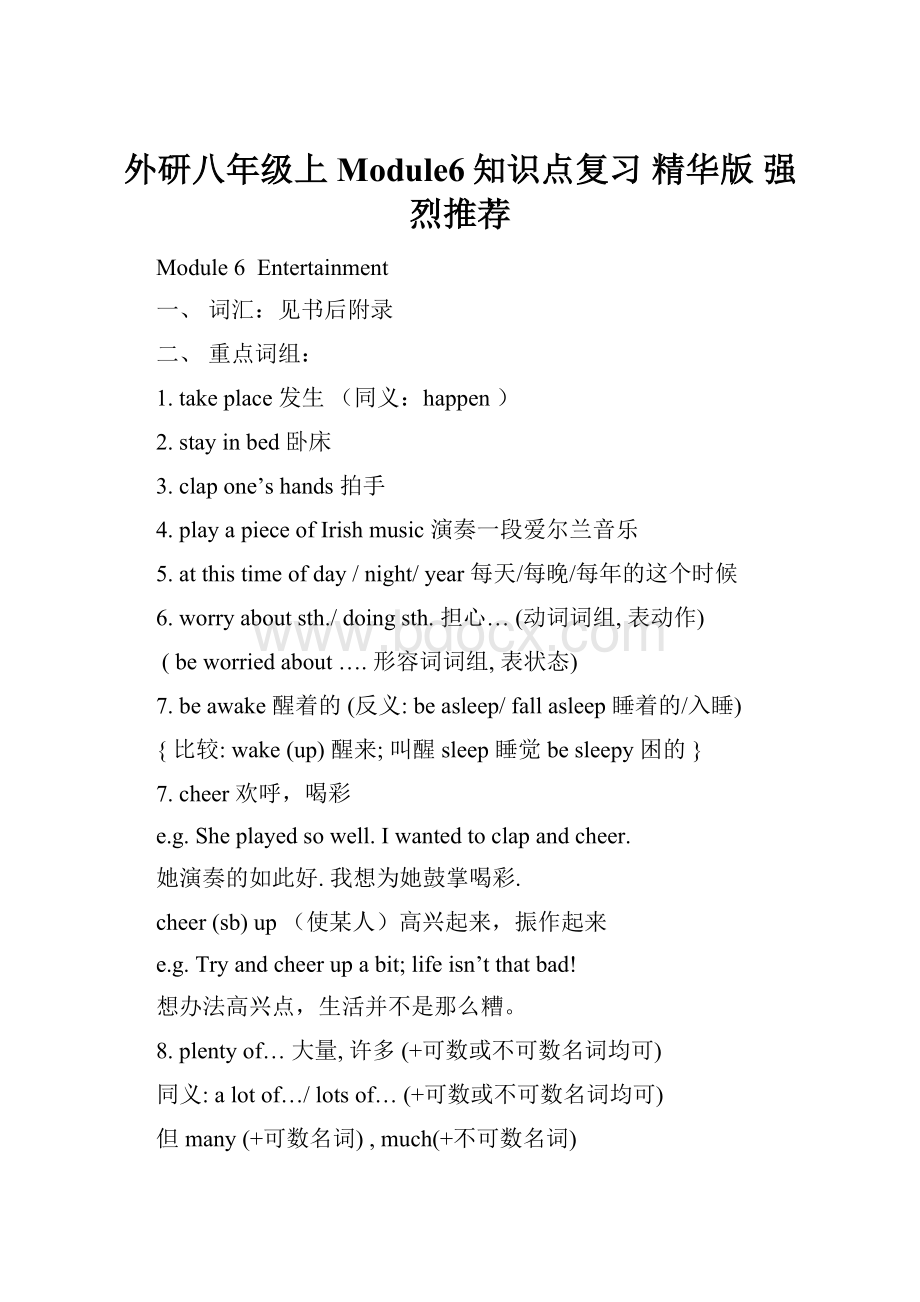外研八年级上Module6知识点复习 精华版 强烈推荐.docx
《外研八年级上Module6知识点复习 精华版 强烈推荐.docx》由会员分享,可在线阅读,更多相关《外研八年级上Module6知识点复习 精华版 强烈推荐.docx(11页珍藏版)》请在冰豆网上搜索。

外研八年级上Module6知识点复习精华版强烈推荐
Module6Entertainment
一、词汇:
见书后附录
二、重点词组:
1.takeplace发生(同义:
happen)
2.stayinbed卧床
3.clapone’shands拍手
4.playapieceofIrishmusic演奏一段爱尔兰音乐
5.atthistimeofday/night/year每天/每晚/每年的这个时候
6.worryaboutsth./doingsth.担心…(动词词组,表动作)
(beworriedabout….形容词词组,表状态)
7.beawake醒着的(反义:
beasleep/fallasleep睡着的/入睡)
{比较:
wake(up)醒来;叫醒sleep睡觉besleepy困的}
7.cheer欢呼,喝彩
e.g.Sheplayedsowell.Iwantedtoclapandcheer.
她演奏的如此好.我想为她鼓掌喝彩.
cheer(sb)up(使某人)高兴起来,振作起来
e.g.Tryandcheerupabit;lifeisn’tthatbad!
想办法高兴点,生活并不是那么糟。
8.plentyof…大量,许多(+可数或不可数名词均可)
同义:
alotof…/lotsof…(+可数或不可数名词均可)
但many(+可数名词),much(+不可数名词)
9.lookafter…(well)(把…)照顾好同义:
take(good)careof…
10.thereasonfor……的原因
e.g.What’sthemainreasonforhervisit?
她参观的主要原因是什么?
11.themusicvideobysb.某人的音乐电视
e.g.IlikewatchingthemusicvideobyJayZhou.我喜欢看周杰伦的音乐电视.
12.befamousfor…因…而著名
e.g.HangzhouisfamousfortheWestLake.杭州因西湖而著名.
befamousas…作为…而著名
e.g.ZhangZiyiisfamousasanactress.作为一名女演员章子怡很著名.
13.bepopularwith…在…中受欢迎
e.g.HarryPotterisverypopularwiththeyoungreaders.
哈里波特在年轻读者中很受欢迎.
14.actwellinthefilm在电影中演得好
15.makethecharacterbelievable使得人物很可信
16.facetoface面对面,面临
e.g.I’dliketotalktoyoufacetoface.我想和你面谈。
Theteachercamefacetofacewithsuchaproblemforthefirsttime.
老师第一次面对这样的问题。
17.lookdangerous看起来很危险
18.truetolife反映真实生活的,反映现实的
e.g.Thefilmisn’ttruetolife,butit’sveryexciting.
这部电影并不真实,但非常激动人心。
Thebookisquiteinterestingbutthecharactersarenotverytruetolife.
这本书很有意思,但是里面的人物却不是很真实。
19.inone’sopinion在某人看来,依某人的观点
20.advisesb.todosth.建议某人做某事
21.comeout上映
e.g.Ididn’tseethefilmwhenitfirstcameout.
这部电影第一次上映时我没看.
22.allweek/allday整个星期/整天
23.beon上映
e.g.Hesaidthefilmwouldbeonatthestudentcinema.
他说这部电影将在学生影院上映.
24.theadventurefilm惊险片
25.Ibegyourpardon/Pardon请再说一遍好吗?
(我没听清)
26.haveagood/great/wonderfultime=enjoyoneself/oneselves
玩得高兴
27.lookfor…寻找…
28.staytogether呆在一起
29.bepleasedwithsth.对…满意bepleasedtodosth.很高兴做某事
三、重要知识点:
1.Myvisithereisallaboutmakingfriends.
我来这儿的目的就是交朋友.
2.辨析among与between
among指三者或三者以上当中,而between指两者当中.
e.g.Pleaseshareoutthebooksamongtheclass.请把书分发给全班。
He’sstandingamongthecrowd.他正站在人群当中。
Sheknowsthatshe’samongfriends.她知道她周围有很多朋友。
Shesitsbetweenyouandme.她坐在你和我中间。
There’salotofdisagreementbetweenthetwopoliticalpartiesonthisissue.在这个问题上,两个政党之间有很大分歧。
3.Wasthatit?
就这些吗?
That’sit!
就这些.
4.名词作定语,如:
thestudentcinema,theappletree,theshoefactory,theroomnumber,thefilmticket,这里斜体的名词都做了定语,修饰后面的中心词。
要特别注意这种结构的复数形式一般只变后面的中心词,前面做定语的名词不变,如:
thestudentcinemas,theappletrees,theshoefactories,theroomnumbers,thefilmtickets
但是若定语名词本身复数变化形式属特殊变化,则变复数时,两个名词都变,如:
womendoctors,womenprofessors
5.havetodosth./hastodosth./hadtosth.不得不,必须,指客观需要;而must必须,指主观看法。
e.g.TheTVsetisbroken.Ihavetobuyanewone.(客观需要)
Idon’tliketheTVset.Imustbuyanewone.(主观看法)
6.although(同义:
though或eventhough)
虽然,尽管,即使;然而,可是(注意决不能与but连用)
e.g.Although/Though/Eventhoughwealltriedourbest,welostthegame.虽然我们已尽了最大的力量,但我们还是输了。
Welostthegamealthough/though/eventhoughwealltriedourbest.
我们输了,然而我们已尽了最大的力量。
7.辨析except(for)与besides
两者都译为“除了…”,但except(for)指排除在外,而besides指包含在内.
e.g.Heansweredallthequestionsexcept(for)thelastone.他除了最后一道题,其它的都回答出来了。
(thelastone没答出来,被排除在外)
Allthestudentswenttotheparkexcept(for)Tom.
除了汤姆,所有的同学都去了公园。
(Tom没去,被排除在外)
TherearemanyotheranimalsinBeijingZoobesidestigers.
北京动物园除了老虎还有很多别的动物。
(老虎也有,应包含在内)
TherewerethreeotherpeopleatthemeetingbesidesMr.Black.
会议上除了Black先生还有其他三个人。
(Mr.Black也在会议上,应包含在内)
8.辨析except与exceptfor
1)当除去的事物与前面的事物是同类,则用except和exceptfor均可.
e.g.Heansweredallthequestionsexcept(for)thelastone.
Allthestudentswenttotheparkexcept(for)Tom.
2)当除去的事物与前面的事物不是同类,而是在说明基本情况之后,引出一个相反的细节,在某一方面对句子的主要意思加以修正,这时则只能用exceptfor.
Exceptforoneoldlady,thebuswasempty.
除了一位老太太,公共汽车上没有别的乘客.(oneoldlady与thebus不属于同类的事物,所以只能用exceptfor.)
Theroadswereclearexceptforafewcars.
除了几辆小汽车外,马路上空荡荡的.(theroads与cars不属于同类的事物,所以只能用exceptfor.)
3)若此表达置于句首,则只能用exceptfor.
e.g.ExceptforMary,everyoneattendedtheparty.
除玛莉外,所有的人都参加了晚会.
9.辨析true与real
true表示“与事实相符”,反义词为false或untrue;real表示“现实中存在的”,指天然的,不是人工的,反义词为fake(赝品)。
e.g.Whathesaidistrue.他所说的是真的。
Theringisrealgold/diamond.这戒指是真金/真钻石。
四、语法:
直接引语与间接引语的转化
直接引语转化为间接引语需要注意以下四个方面:
1.引导词的确定:
1)直引为一般陈述句时,变为间引由that引导,that可以省略。
直接引语:
Hesaid,“It’stimeforlunch.”
间接引语:
Hesaid(that)itwastimeforlunch.
2)直引为一般疑问句时,变为间引由if/whether引导。
直接引语:
Shesaid,“Areyouinterestedinchemistry?
”
间接引语:
Sheaskedmeif/whetherIwasinterestedinchemistry.
3)直引为特殊疑问句时,变为间引由原有的特殊疑问词引导。
直接引语:
Heaskedme,“Whatarethese?
”
间接引语:
Heaskedmewhatthosewere.
在后两种情况中,即当直引是疑问句时,变间引还要注意以下三点:
a)要将主句中的引述动词said改为asked;
直接引语:
Shesaid,“Areyouinterestedinchemistry?
”
间接引语:
Sheaskedmeif/whetherIwasinterestedinchemistry.
b)没有间接宾语时,可以根据内容加一个间接宾语如me,him或us;
直接引语:
Shesaid,“Areyouinterestedinchemistry?
”
间接引语:
Sheaskedmeif/whetherIwasinterestedinchemistry.
c)从句要由原来的疑问句语序变为陈述句语序。
直接引语:
Heaskedme,“Whatarethese?
”
间接引语:
Heaskedmewhatthosewere.
(因间接引语在多数情况下都构成一个宾语从句,所以都遵循宾语从句的要求。
)
2.人称要随主语做适当变化,包括人称代词和物主代词。
(这与汉语是一致的。
)
直接引语:
Hesaidtome,“IbrokeyourCDplayer.”
间接引语:
HetoldmethathehadbrokenmyCDplayer.
3.谓语动词时态的变化:
(两种情况)
1)若引述动词为现在范畴的时态(一般现在时、现在进行时、现在完成时)或将来时,那么直引变间引时,间接引语中动词的时态不变.
直接引语:
Thechildalwaysaskshermother:
“AmIagoodgirl?
”
间接引语:
Thechildalwaysaskshermotherifsheisagoodgirl.
2)若引述动词为一般过去时,那么间接引语中动词的时态要向前推进一步.具体遵循下面的规律:
直接引语中的时态
变为间接引语中的时态
一般现在时
一般过去时
现在完成时
过去完成时
一般将来时
现在进行时
现在完成进行时
shall
should
will
would
may
might
can
could
一般过去时
过去完成时
过去完成时
过去完成时(不变)
过去将来时
过去进行时
过去完成进行时
should
should(不变)
would
would(不变)
might
might(不变)
could
could(不变)
e.g.a)一般现在时→一般过去时
直接引语:
Hesaid,“I’mafraidIcan’tfinishthework.”
间接引语:
Hesaidthathewasafraidhecouldn’tfinishthework.
b)一般过去时→过去完成时
直接引语:
Hesaid,“Icametohelpyou.”
间接引语:
Hesaidthathehadcometohelpme.
c)现在完成时→过去完成时
直接引语:
Shesaid,“I’venotheardfromhimsinceMay.”
间接引语:
ShesaidthatshehadnotheardfromhimsinceMay.
d)过去完成时→过去完成时
直接引语:
Hesaid,“Ihadfinishedmyhomeworkbeforesupper.”
间接引语:
Hesaidthathehadfinishedhishomeworkbeforesupper.
e)一般将来时→过去将来时
直接引语:
Shesaid,“I’lldoitafterclass.”
间接引语:
Shesaidthatshewoulddoitafterclass.
f)现在进行时→过去进行时
直接引语:
Hesaid,“I’musingtheknife.”
间接引语:
Hesaidthathewasusingtheknife.
g)现在完成进行时→过去完成进行时
直接引语:
Hesaid,“I’vebeenwaitinghereforanhour.”
间接引语:
Hesaidthathehadbeenwaitingthereforanhour.
h)情态动词的变化
直接引语:
“WhatcanIdoforyou?
”heaskedme.
间接引语:
Heasked(me)whathecoulddoforme.
直接引语:
Hesaid,“MayIspeaktoMary,please?
”
间接引语:
HeaskedmeifhemightspeaktoMary.
3)若直接引语表示客观真理,那么转换时时态不变.
e.g.直接引语:
Heasked,“Whichstaristhebiggest?
”
间接引语:
Heaskedwhichstaristhebiggest.
直接引语:
Hesaid,“Lighttravelsmuchfasterthansound.”
间接引语:
Hesaidthatlighttravelsmuchfasterthansound.
4.其他变化(即时间状语、地点状语和指示代词):
直接引语中状语、指示代词
间接引语中状语、指示代词
today
yesterday
tomorrow
nextweek/year/month
lastweek/year/month
ago
three/four…days/yearsago
now
here
sofar
in2001
this
these
come
thatday
thedaybefore
thenextday/thefollowingday
thenextweek/year/month
theweek/year/monthbefore
before
three/four…days/yearsbefore
then
there
bythen
in2001(不变)
that
those
go
(这里注意:
如果在当地转述,here不必改为there,动词come不必改为go。
如果在当天转述,yesterday,tomorrow等时间状语也不必改变。
)
e.g.直接引语:
Shesaid,“I’llfinishtheworkthismorning.”
间接引语:
Shesaidthatshewouldfinishtheworkthatmorning.
直接引语:
Hesaid,“Thesebooksaremine.”
间接引语:
Hesaidthatthosebookswerehis.
直接引语:
Hesaid,“It’snineo’clocknow.”
间接引语:
Hesaidthatitwasnineo’clockthen.
直接引语:
Hesaid,“Ihaven’tseenhertoday.”
间接引语:
Hesaidthathehadn’tseenherthatday.
直接引语:
Shesaid,“Iwentthereyesterday.”
间接引语:
Shesaidthatshehadgonetherethedaybefore.
直接引语:
Shesaid,“I’llgotheretomorrow.”
间接引语:
Shesaidthatshewouldgotherethenext/followingday.
直接引语:
Shesaid,“Heleft30minutesago.”
间接引语:
Shetoldmethathehadleft30minutesbefore.
直接引语:
Hesaid,“Mysisterwashereoneweekago.”
间接引语:
Hesaidthathissisterhadbeenthereoneweekbefore.
直接引语:
Shesaid,“I’llcomeherethisevening.”
间接引语:
Shesaidthatshewouldgotherethatevening.
各位家长,您的孩子是否已掌握了本模块的知识,请签字或留下您的建议,谢谢!